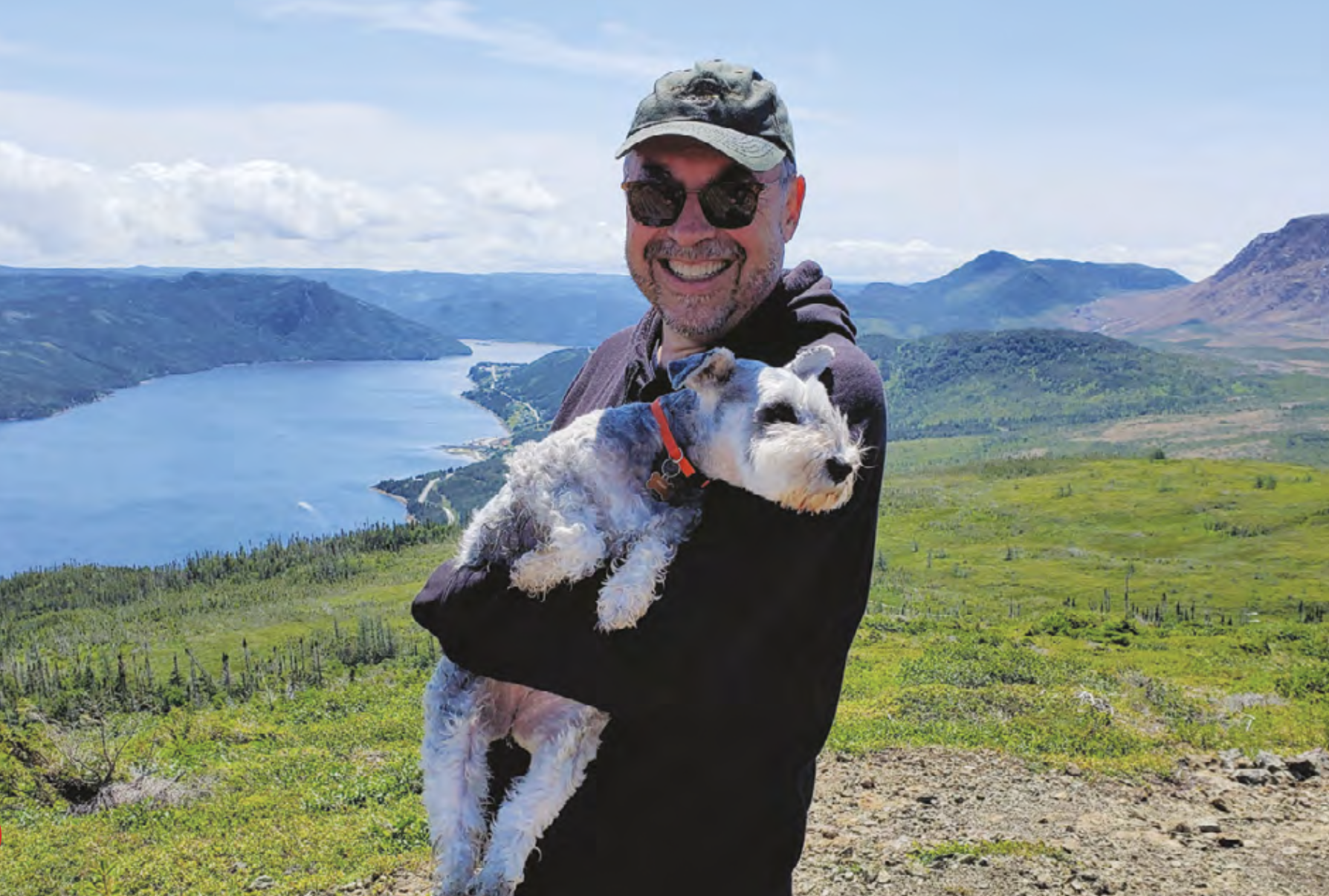One of Canada’s foremost journalists and authors reflects on the importance of sports, words, and community
By Rob Lutes
Where were you born?
I was born in Hamilton, Ontario, which is where I live. My roots and my parents’ roots are pretty deeply entrenched around this city.
Did your parents inspire you to become a writer?
My dad was a very creative guy. He was a self-taught artist—he had a square job where he designed the layouts of factories for the American Can Company, but he was a very good musician. He had played with Tommy Dorsey and others. So the biggest influence he had on me was musical. My early attempts to be a musician came out of being in a house that was the cathedral of Duke Ellington and Count Basie. My mom was a farm girl. She went out to work after my sister and I grew up. But her roots were very much in the farm country just outside of town.
Were they interested in sports?
They were crazy Hamilton Tiger-Cat fans because that’s what you were if you lived in Hamilton in the ’50s and ’60s. You thought of yourself as part of a blue-collar town with a rough, tough, honest football team. And you resented everything about Toronto. It wasn’t just about going as a spectator—it was who you were. That informed my thinking about a lot of the stuff I wrote about later in the books but also as a sports columnist—that idea of what it meant to be a fan, how you were wrapped into where you came from, and just drilling down into why sports matters to people and how it matters to people.
Did the local team mean more back then?
It was different. You couldn’t watch everything from everywhere. There was one baseball game a week, one hockey game a week. Even the Tiger-Cats games were blacked out when they played at home. We used to gather around the radio like it was the 1930s to listen to those games. So it was more pure. That’s not a value judgment, but if you grew up in a little town in the early 20th century, the local guys playing on a ball field or the hockey team would have been your heroes.
You were a sports columnist at The Globe and Mail for more than 20 years. Can you talk about your approach to that work?
What I realized through trial and many errors was that a column has to be a single idea. If you have more than a single idea in 750 to 900 words, you’re going to mess it up. There are a lot of different ways to approach it. Some guys are hot-button guys—you know, the “Fire the coach!” kind of thing. Some guys write funny. That’s really, really hard. But you understand what your own thing is eventually. I tried to be reasonable, and I tried to be smart. And I tried to bring something else to it from other elements of my experience.
Was it difficult to generate ideas?
Well, that’s the thing about sports—there are only two stories. They win or they lose, right? So how do you find a way to keep your mojo? You gotta dig. I had to find other things to write about to create meaning. And it’s a good technique for the rest of life—the ability to create and find meaning. But once you have an idea, it’s smooth sailing—at least it was for me. Maybe it’s because of writing on all those hard deadlines over the years, but I just start typing. If I’m writing a book, it’s the same thing. Not planning it out or having a schematic. The people who really could do it were all great deadline warriors. It’s like a secret society, because we remember what it was like when you looked up at the clock and you had a blank screen in front of you and you had 15 minutes to generate 800 words.
Did you have a mentor?
The guy who was kind of my hero was Milt Dunnell. He was the lead sports columnist at the Toronto Star for 50 years. I worked next to him when he was in his 80s and I was in my 20s. I’d sit with him at an event and say “You ever seen anything like this before?” And he’d say “Well, yes, you know, I was at the first Marciano-Walcott fight” or something. He had seen everything and done everything and he was still on. He worked deadlines. He would go the extra mile. He never took it for granted. And Milt was a guy who never used the word “I,” which was also my rule. I’m old school in that sense. No first person, ever, because it’s cheap. “I think” is the cheapest sentence.
You’ve written 21 books on sports, many of them bestsellers. Is there one you feel strongly about right now?
One I’m very proud of is the Jordin Tootoo book, the first one [All the Way—TooToo is a retired NHL player]. He and I just did a second one [Mind Over Matter], which came out this fall. So many people from First Nations communities saw themselves in that first book. TooToo had the honesty and willingness to tell a really hard story, much of which is about himself, where he doesn’t come off looking great. Of all the stuff I’ve done, it’s the one that probably matters the most.
You’ve been a fixture on sports radio and television for a couple of decades, but even non-sports fans would likely recognize your distinctive voice from your powerful video essays, particularly the one at the close of the 2010 Vancouver Olympics.
That piece changed my life. The Globe was part of the media consortium covering the games. I worked with Matt Dunn, a producer, to do a first piece when the games began, and they wanted us to do a piece to sum things up at the end. Ken Volden, who’s at TSN, suggested the idea of a new kind of Canadian Olympic pride, because there was something special happening in Vancouver. There was lots of music at those Olympics, and I had gone to see Hey Rosetta!, a Newfoundland band, with my wife, Jeannie. They played “Red Heart” during their set, and she suggested using that song for the closing video. So the combination of the moment, working with Matt, and that song kind of freed me up to write something that was more emotional. And I remember when it ran that night on the broadcast, I walked out of the International Broadcast Centre and people were applauding.
You left The Globe and Mail in 2011, and last year you left Sportsnet. How are you viewing this new chapter of your life?
I’m wrestling with it. It took me a while to embrace the seniors’ discount. Now I do. But it wasn’t really until this past fall that I thought “Okay, what do I want to do, and what do I have to do?” It’s an interesting moment because you look ahead and say “I feel like I’ve still got my fastball, and I have a level of experience that most people don’t have in the business.” And there are people who want to work with me. But I’m wary. I want to be able to do the things I want to do, and I probably won’t be able to do that stuff when I’m 85.
You spend part of your summers in Woody Point, on the western coast of Newfoundland. How did that come about?
I was there in 2000 to write a magazine piece about fly-fishing and I fell in love with the place. The next year I got The Globe to send me back to cover the Royal St. John’s Regatta, which is the oldest sporting event in North America, and I brought the family. We drove around for a couple weeks, and just before we came back I saw an ad in a paper for a cabin for sale. We looked around inside and didn’t even see it in the daylight and bought it—the most impulsive thing we’ve ever done. We had three young kids, and Newfoundland is not an easy place to get to, and I had a job, or jobs. But it was kind of meant to be, you know. By the end of our first year there, we had become more involved in the community. And that became the attraction—being part of this very different place.
How did you come to be one of the founders of the now internationally recognized Writers at Woody Point festival?
A guy in the community, Charlie Payne, was restoring the old Loyal Orange Society Lodge, which had been the focal point of the community for decades. He thought he would do kitchen parties for tourists in this building because the town is right in the middle of the national park [Gros Mornes]. A bunch of us helped him raise the money to refurbish the place, but then he was booking stuff in there and no one was showing up. So I suggested that we should have a literary festival. And I’d never been to one, so I had no idea what I was talking about.
But we kicked this thing off, and we added music, and I got some people to come basically on faith because I didn’t know if I could pay anybody. The first night, we had no idea who was going to show up. Michael Crummey was reading, and the place filled up like magic. It’s been full ever since. It took a while, but the community embraced it eventually because suddenly their town was getting a lot of attention and there was an economic-development component to it.
What have you learned from building the festival?
It’s such a labour of love. It comes back to: What’s a community? What’s the glue that holds it together? And what will people rally around? Woody Point was a great place before this festival, but there’s a real swagger to it now. We had Gord Downie come one year, and people there were totally blasé. The attitude was “Of course these people come to our town.” I love that. Of all the projects I’ve done, that’s the one I hope is going to be there long after I’m gone.






